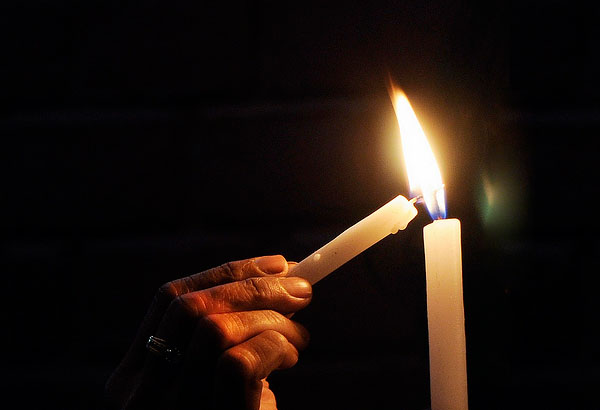Paralyzed ERC warns of massive blackouts

In the absence of a quorum as all its commissioners are temporarily out of work, the ERC would not be able to perform important judicial and quasi-legislative functions such as setting schedules for hearings, addressing consumer concerns and cases of violations by industry players of existing laws, issuing certificates of compliance or provisional authorities to operate power plants, and awarding of procurement contracts, among others. File
MANILA, Philippines — The year-long suspension of all four commissioners of the Energy Regulatory Commission (ERC) will lead to “severe paralysis” of the entire power industry, possibly leaving many areas in Metro Manila and nearby provinces without electricity for long periods.
Newly appointed ERC chair and chief executive officer Agnes Devanadera raised the scenario in reaction to the suspension by the Office of the Ombudsman of commissioners Alfredo Non, Gloria Yap-Taruc, Josefina Patricia Magpale-Asirit and Geronimo Sta. Ana.
Malacañang, specifically the Office of the Executive Secretary, is considering dismissing the four officials and appointing their replacements to stave off disruption in ERC operations, according to presidential spokesman Harry Roque.
Devanadera yesterday said there are P1.59 billion worth of power service applications awaiting immediate attention. She said the cases against the suspended officials would affect the capital expenditures of firms involved in possible irregularities, including the Manila Electric Co. (Meralco).
“The brownouts and the blackouts, if we will not be able to act on the pending petitions, may not happen just in the provinces but also in Metro Manila. We also have safety issues we have to address. These capex consist usually of funds they need and must have the approval of ERC to continue their rehabilitation. We are so typhoon-prone. We cannot be holding action on this,” Devanadera pointed out.
“The debilitating impact of the ombudsman’s decision to suspend the four incumbent ERC commissioners will render the operations of the agency in severe paralysis,” she added.
“As a collegial body, the presence of at least three members of the commission is needed to constitute a quorum to enable the ERC to adopt any ruling, order, resolution, decision or other acts of the Commission in the exercise of its quasi-judicial and quasi-legislative functions,” she added.
The ERC is now seeking guidance from President Duterte – being the appointing authority – in the implementation of the ombudsman’s suspension order.
Citing the ombudsman’s office order No. 409, she said any decision on administrative cases should be implemented by the concerned government agencies.
In her statement, Devanadera stressed she was not recommending the withdrawal of the suspension order but was merely stating its impact on the ERC and on the whole power industry in general.
She said the agency has embarked on a zero backlog program, citing numerous applications still pending since 2009.
In the absence of a quorum as all its commissioners are temporarily out of work, the ERC would not be able to perform important judicial and quasi-legislative functions such as setting schedules for hearings, addressing consumer concerns and cases of violations by industry players of existing laws, issuing certificates of compliance or provisional authorities to operate power plants, and awarding of procurement contracts, among others.
There are also 135 power supply agreement applications worth P1.2 trillion awaiting action, including the seven PSA filings of Meralco.
Meanwhile, the accrued interest of the Feed-in Tariff Allowance (FIT-All) fund has already ballooned to P526.7 million.
“The longer we do not act on this, the more consumers will suffer. It does not mean, however, that whatever is stated in the application will be granted in toto. We usually do a haircut on applications after evaluation,” Devanadera said.
The ERC chief said the situation – if left to deteriorate – could place the government’s Build, Build, Build program in peril since major infrastructure projects require massive power supply.
“There is definitely an impact, especially we’re talking of trillions of pesos that will be put into the mainstream economy,” Devanadera said.
The Duterte administration is embarking on a three-year rolling infrastructure program amounting to P3.6 trillion from 2018 to 2020. Officials dubbed it the country’s “golden age” of infrastructure.
The Department of Energy (DOE) has set a new target of 43,765 megawatts (MW) of additional power capacity by 2040 in accordance with its long-term vision dubbed Ambisyon Natin 2040.
Until 2040, the country would need 25,265 MW of baseload power which could be sourced from coal, geothermal natural gas, nuclear, biomass and hydropower; 14,500 MW of mid-merit power from power sources such as natural gas; and 4,000 MW peaking power from diesel oil, wind and solar resources.
The DOE has been inviting foreign investors to invest in the Philippine power sector as the administration’s massive infrastructure program would require a huge amount of energy supply.
In an interview, Roque said Executive Secretary Salvador Medialdea is examining the bases for the suspension of the four commissioners to determine if such bases could be used to justify their eventual dismissal.
Roque emphasized that Malacañang has the power to suspend or remove appointees. He maintained that the executive could not just let the four ERC commissioners serve their suspension as such would affect the functions of the commission.
He assured the public as well as industry players of uninterrupted work at the ERC, saying its chairman and CEO is not among those suspended. – Christina Mendez
- Latest
- Trending



























